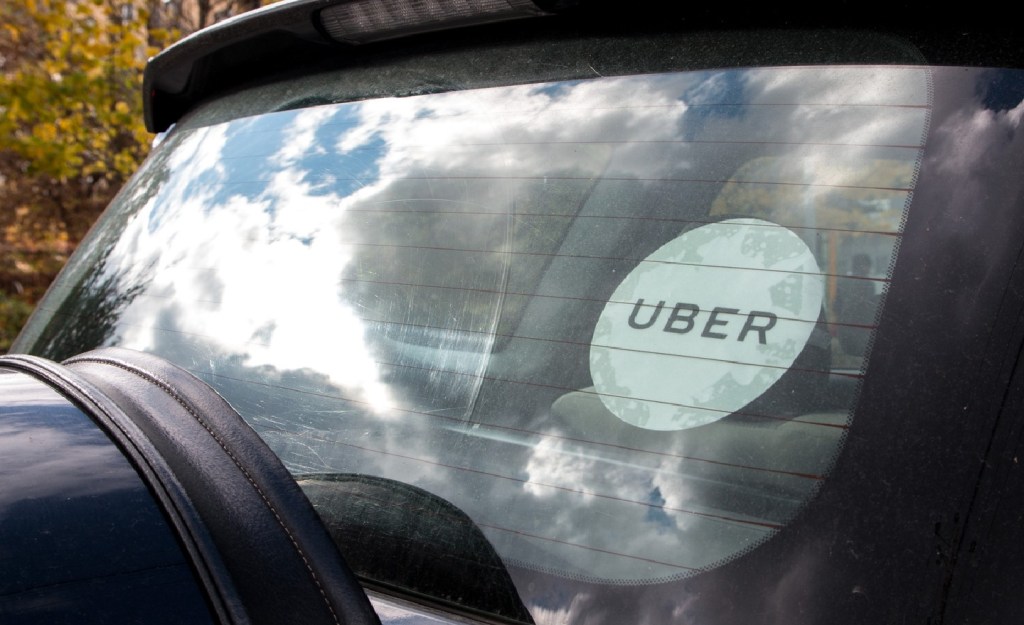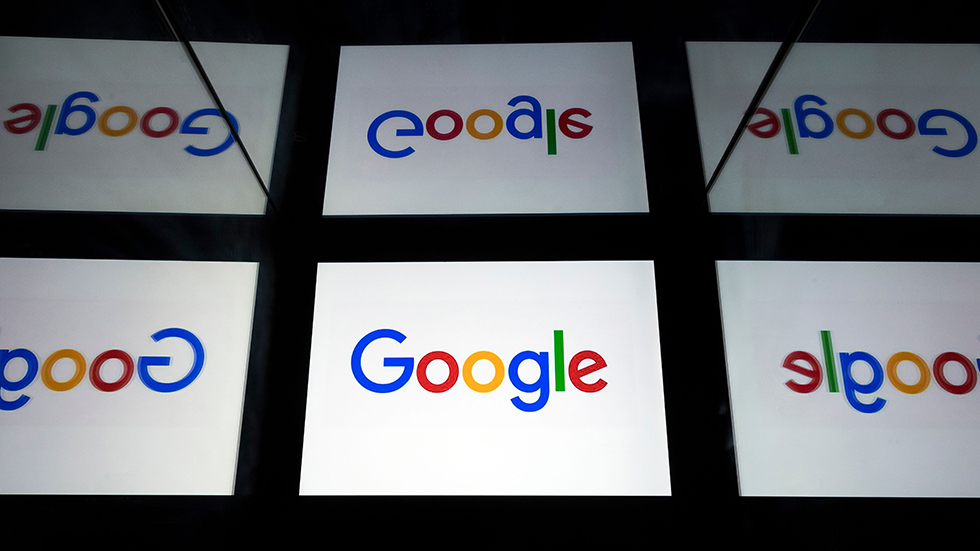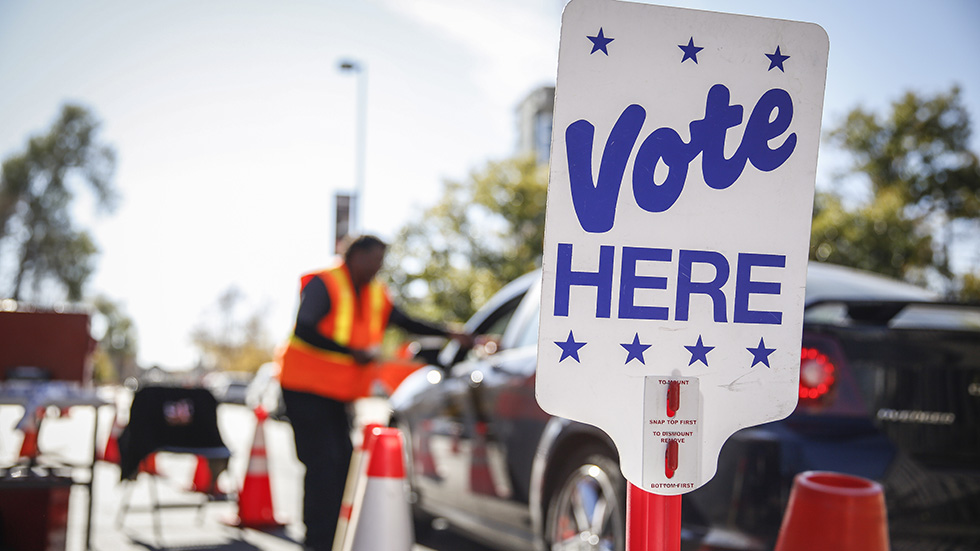Hillicon Valley — Justice Department takes on Uber

Today is Wednesday. Welcome to Hillicon Valley, detailing all you need to know about tech and cyber news from Capitol Hill to Silicon Valley. Subscribe here: digital-stage.thehill.com/newsletter-signup.
Follow The Hill’s cyber reporter, Maggie Miller (@magmill95), and tech team, Chris Mills Rodrigo (@millsrodrigo) and Rebecca Klar (@rebeccaklar_), for more coverage.
The Biden administration launched a lawsuit against another Silicon Valley company on Wednesday — this time setting its sights on Uber. The Justice Department’s complaint alleges the ride-hailing service discriminated against passengers with disabilities through “wait time” fee charges, but Uber denied the allegations and called the lawsuit “surprising and disappointing.”
Meanwhile, the U.S. and France announced new initiatives to strengthen cybersecurity and space issues following a meeting between Vice President Harris and French President Emmanuel Macron, and a top cybersecurity official outlined steps being taken to beef up the ability to push back against online disinformation and misinformation.
Let’s jump in.
DOJ sues Uber over ‘wait time’ fees for passengers with disabilities

The Justice Department is suing Uber over allegations that it discriminated against passengers with disabilities through the platform’s “wait time” fee charges.
The allegations: The lawsuit, filed Wednesday, alleges the ride-hailing service overcharged passengers with disabilities in violation of the American with Disabilities Act (ADA) by failing to reasonably modify its wait time fee policy for passengers who need more than the allotted two minutes to get into an Uber car.
“People with disabilities deserve equal access to all areas of community life, including the private transportation services provided by companies like Uber,” Assistant Attorney General Kristen Clarke for the Department of Justice’s (DOJ) Civil Rights Division said in a statement.
“This lawsuit seeks to bring Uber into compliance with the mandate of the Americans with Disabilities Act while sending a powerful message that Uber cannot penalize passengers with disabilities simply because they need more time to get into a car.”
The government is asking the court to order Uber to change its policy in a way that is compliant with the ADA and pay damages to people subjected to what the department is calling illegal wait time fees.
Uber’s response: Spokesperson Noah Edwardsen said “we fundamentally disagree that our policies violate the ADA.”
“Wait time fees are charged to all riders to compensate drivers after two minutes of waiting, but were never intended for riders who are ready at their designated pickup location but need more time to get into the car. We recognize that many riders with disabilities depend on Uber for their transportation needs, which is why we had been in active discussions with the DOJ about how to address any concerns or confusion before this surprising and disappointing lawsuit,” Edwardsen said in a statement.
French (cyber) connection

Vice President Harris on Wednesday announced new initiatives with France on space and cybersecurity following a meeting with French President Emmanuel Macron in Paris.
Strengthening ties: The White House that Harris and Macron agreed to launch a “comprehensive” bilateral dialogue on space through which U.S. and French officials will work together to address issues like climate change, expand space exploration, and expand access to science, technology, engineering and mathematics (STEM) education.
“Noting the 60 years of U.S.-France partnership in space and the growing importance of space in providing benefits to people around the world, Vice President Harris and President Macron agreed to establish a U.S.-France Comprehensive Dialogue on Space to enhance civil, commercial, and national security space cooperation,” the vice president’s senior adviser and chief spokesperson Symone Sanders said in a statement.
Harris, who chairs the National Space Council, also announced that the U.S. would join the Space Climate Observatory, an international initiative of space agencies and organizations that focuses on the impact of climate change. France’s National Centre for Space Studies is also part of the initiative.
Emphasis on cyber: Additionally, Harris announced that the U.S. would support the Paris Call for Trust and Security in Cyberspace, an initiative that Macron announced in 2018 to bring governments and the private sector together to advance cybersecurity based on nine principles.
CONFRONTING DISINFO AND MISINFO
The Cybersecurity and Infrastructure Security Agency (CISA) is beefing up its disinformation and misinformation team in the wake of a divisive presidential election that saw a proliferation of misleading information online.
“I am actually going to grow and strengthen my misinformation and disinformation team,” CISA Director Jen Easterly said during virtual remarks at the RE:WIRED conference on Wednesday.
Easterly noted that earlier this week she had a meeting with “six of the nation’s experts” in the disinformation and misinformation space. She stressed her concerns around this being a top threat for CISA, which is charged with securing critical infrastructure, to confront.
“One could argue we’re in the business of critical infrastructure, and the most critical infrastructure is our cognitive infrastructure, so building that resilience to misinformation and disinformation, I think, is incredibly important,” Easterly said.
Her comments came a year after CISA came under fire by then-President Trump for its efforts to push back against election misinformation and disinformation, primarily through setting up a “rumor control” website. Trump fired former CISA Director Chris Krebs, and several other top CISA officials were forced to resign in the weeks following the 2020 presidential election, largely as a result of this effort.
THE EPIC SAGA CONTINUES
A federal judge ordered Apple to allow app developers to include links to payment methods outside its app store next month, denying the tech giant’s request for a delay after the judge’s initial ruling in the company’s lawsuit with Epic Games.
Apple’s argument in its appeal was “fundamentally flawed” and failed to address the court’s findings, Judge Yvonne Gonzalez Rogers said in a decision Tuesday.
“In short, Apple’s motion is based on a selective reading of this Court’s findings and ignores all of the findings which supported the injunction, namely incipient antitrust conduct including supercompetitive commission rates resulting in extraordinarily high operating margins and which have not been correlated to the value of its intellectual property. This incipient antitrust conduct is the result, in part, of the antisteering policies which Apple has enforced to harm competition,” Gonzalez Rogers wrote.
Apple largely won the case brought by the developer behind the popular Fortnite game, with the judge ruling in September that Apple is not an illegal monopoly, as alleged by the developer.
But with the ruling, Gonzalez Rogers issued an injunction restraining Apple from prohibiting developers from including external links directing customers to options to make purchases outside of the in-app payment system.
EU court upholds Google fine

A key European court on Wednesday upheld a $2.8 billion antitrust fine against Google, a major decision as the company fights regulators on multiple fronts.
The original 2017 European Commission fine concerned the company promoting its own shopping comparison tool over competitors in search results.
Google has argued that its services help consumers find products they want and assists sellers.
The ruling from the European Union’s General Court in Luxembourg can still be appealed to the bloc’s highest judicial body.
FOR BETTER OR WORSE
About 3 in 4 Americans say Facebook is making society worse, but they’re split on placing the fault on the platform itself, according to a new poll.
Among the 76 percent of surveyed Americans who said the platform makes society worse, 55 percent said the blame primarily lies with the way “some people use Facebook” and 45 percent said it rests more on “the way Facebook itself is run,” according to the CNN poll released Wednesday.
Although the majority of both Democratic and Republican respondents, 70 and 82 percent respectively, said Facebook makes society worse, responses on which reason is at fault are split more along partisan lines.
Read more about the poll’s findings.
DISCREET DISLIKES
YouTube announced Wednesday it will start hiding dislikes on videos.
The Google-owned company said in a statement that “earlier this year, we experimented with the dislike button to see whether or not changes could help better protect our creators from harassment, and reduce dislike attacks,” wherein viewers try to rack up dislikes on particular content.
“As part of this experiment, viewers could still see and use the dislike button. But because the count was not visible to them, we found that they were less likely to target a video’s dislike button to drive up the count,” YouTube said.
BITS AND PIECES
An op-ed to chew on: Understanding the barriers between scientists, the public and the truth
Lighter click: Take note
Notable links from around the web:
Meet Angelina. She got job interviews at top tech companies. She’s also not real. (Protocol / Anna Kramer)
An Instagram account promised to plant a tree for every pet picture. 4 million posts later, where are they? (The Washington Post / Jennifer Hassan)
School officials welcome Homeland Security surveillance after student fights (The Intercept / Rachel Cohen)
A cyber mercenary is hacking the Google and Telegram accounts of presidential candidates, journalists and doctors (Forbes / Thomas Brewster)
One last thing: Elections are not OK

A bipartisan group of almost 100 former national security officials is urging Congress to take steps to secure elections ahead of next year, warning that without action the nation’s democratic institutions are in “severe jeopardy.”
“We write to express our alarm at ongoing efforts to destabilize and subvert our elections, both through active disinformation campaigns and the related efforts to inject partisan interference into our professionally administered election process,” the officials wrote in an open letter published Tuesday. “We believe these efforts are profoundly damaging to our national security, including by making our elections more vulnerable to foreign interference and possible manipulation.”
“We call on Congress to confront these threats and safeguard our democratic process as we look ahead to the 2022 elections and beyond,” they wrote.
Signatories of the letter included former officials who worked for administrations on both sides of the aisle, including former Homeland Security Secretaries Michael Chertoff and Janet Napolitano, former Defense Secretary William Cohen and former Director of National Intelligence James Clapper.
They also included former ambassadors, top officials at the CIA, and former top cybersecurity officials, including former Cybersecurity and Infrastructure Security Agency Director Christopher Krebs and Michael Daniel, the former White House cybersecurity coordinator under President Obama.
That’s it for today, thanks for reading. Check out The Hill’s technology and cybersecurity pages for the latest news and coverage. We’ll see you Thursday.
Copyright 2023 Nexstar Media Inc. All rights reserved. This material may not be published, broadcast, rewritten, or redistributed. Regular the hill posts







